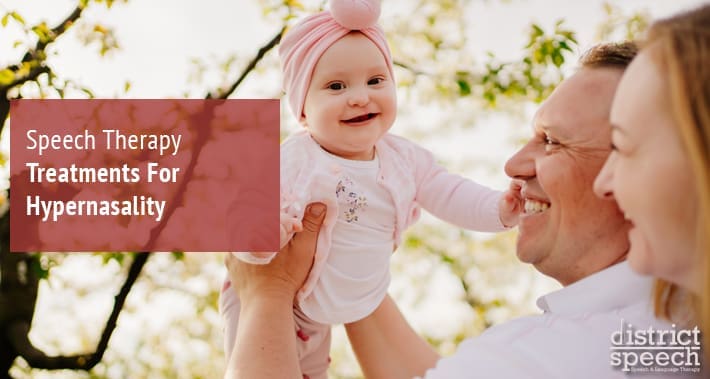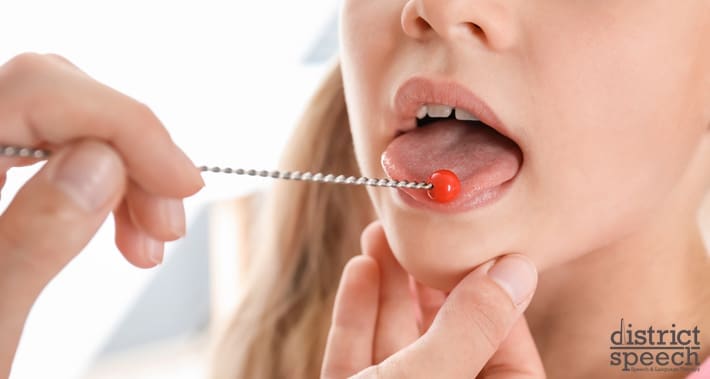
Hypernasality occurs because during your speech your nose (also referred to as our nasal cavity), has too much sound in it.
This is often represented in film and tv for comedic relief, when people speak with a nasally voice.
However, it may not feel great to have your nasally tone be heard more than what you or your child are actually saying.
Talking through your nose may also irritate others, because it can become increasingly difficult to try to understand what you’re saying.
That’s why we recommend that children with hypernasality work with a pediatric speech therapist early on in their speech development, to help their voices be heard.
This is because early intervention of speech disorders is important in helping address and come up with a treatment plan for these concerns early.
If you’re unsure about what hypernasality is, or how a speech therapist can help you or your child, read on to find out more.
What Is Hypernasality?
Resonance is the sound generated from the vibration of sounds against objects.
Think of how your voice echoes when you stand in a cave – that’s resonance.
When you speak, your voice can resonate in different areas of your body.
This includes your nose.
Hypernasalityis a disorder of this resonance where your speech comes out nasally.
This can be learned, or due to a congenital condition.
A person with normal speech capabilities controls the airflow through their nose and mouth by the use of a valve that separates the two.
This valve is called the velopharyngeal valve.
The velopharyngeal valve consists of a number of aspects of your mouth, that are used during speech, and swallowing to separate your oral, and nasal cavities.
When you breathe, this velopharyngeal valve is meant to stay open, and when you speak it’s supposed to be closed by your soft palate (the roof of your mouth).
Hypernasality occurs when this process is altered, or obscured.
It can make the pronunciation of high vowels, such as ‘U’ or ‘I,’ difficult to pronounce without sounding nasally.
Someone with hypernasality often sounds like they’re talking through their nose.
Think of Fran Drescher from the Nanny, or Steve Urkel.
In severe cases, you may have other symptoms as well.
One of these includes having weak or omitted consonants when you speak.
Anybody can have hypernasality in their voice but there are conditions where you are more at risk, such as Down syndrome.
If you suspect you have a resonance disorder like hypernasality, there is hope.
There are a number of speech therapy treatments for resonance disorders.
It’s common for parents to seek speech therapy treatment for their kids.
You may also be wondering at what age you should seek speech therapy for your child.
Earlier is usually better, as hypernasality can lead to your child missing important speech developmental milestones if not caught soon enough.
Although it is more common for parents to seek treatment for their kids’ hypernasality, if you are adult with hypernasality, adult speech therapy can help as well.
What Causes Hypernasality?
Hypernasality is related to articulation.
Misarticulation, in particular, is a mismatch in your articulation of words.
Hypernasality can be caused by learned misarticulation, as well as developmental differences.
The umbrella cause of hypernasality is when there is any form of velopharyngeal incompetence.
Velopharyngeal incompetence is one of the three forms of velopharyngeal dysfunction (VPD).
VPD is when the roof of your mouth or the muscles in your mouth have some sort of abnormality.
In the case of a developmental difference, your velopharyngeal valve may be too short or even unable to close.
Hypernasality can be caused by physical conditions such as:
- congenital conditions like cleft lip and cleft palate
- Neurological conditions, like Parkinson’s disease
Regardless of the cause, in these incidents, more air is entering your nasal cavity than it ought to.
This creates hypernasality.
In some cases, you can treat the hypernasality by treating the root cause.
If the case is you having a cleft lip or palate, you may need surgery.
Your primary care provider can better advise you there.
Even after a cleft palate treatment, however, you may continue to have a nasal heavy voice.
If this is the case for you, speech therapy can help.
Issues of hypernasality can also sometimes arise as a result of one’s accent.
Certain languages, including French, Spanish, Portuguese, Hindi, Vietnamese, Thai, and others are considered to be more nasal than English.
As a result, when you learn English as your second language, you may speak more nasally than a native English speaker.
In these cases, accent modification speech therapy can help.
There are many common myths about accent modification, however.
So, if you’re new to the idea, consider taking a look at the above article.
What Are The Symptoms Of Hypernasality?
The primary symptom of hypernasality is having a voice that resonates in your nose.
If you have hypernasality it may sound like you have excessive nasal resonance, while creating oral consonants or vowels.
You may also have difficulties with swallowing or feeding.
However, the majority of people with hypernasality list the tone of their voice as one of the only symptoms they encounter.
Hypernasality may also cause someone to be self conscious about their voice, and can affect their self confidence, and mental health.
In this case, mental health issues may come up, and you may want to consider speech therapy to improve your mental health.
Speech Therapy Treatments For Hypernasality
If you or a loved one are dealing with hypernasality, a speech therapist can help.
Our speech therapists are trained to properly deal with a myriad of speech disorders.
We can work with you, or your child in our office, but we are able to provide a personalized treatment plan that includes exercises you can practice at home as well.
Starting with a thorough assessment of your condition, your speech therapist can help identify the cause of your hypernasality issues and possible causes.
From there, they can assess your voice, and observe the path of air through your nose.
This is non invasive and often involves just using a mirror and observing where it fogs up as you breathe.
Once they’ve identified the cause, your speech therapist can start to craft a plan for correcting your speech.
This may involve speech therapy on its own, or in combination with surgery.
If the root cause of your hypernasality is due to the structures in your mouth affecting the direct airflow, speech therapy alone won’t solve it.
In that case, the conversation will involve your primary care provider – speech therapists aren’t surgeons.
One form of surgery to correct the structural parts of your mouth, would be surgery for cleft lip and cleft palate.
Even if speech therapy can’t help by itself in the case of structural issues, speech therapy can be a massive aid for post surgery speech development.
Curious about what techniques your speech therapist may implement?
Below are some common approaches to speech therapy for people with hypernasality:

Altering Tongue Placement
Your tongue helps you with multiple important functions.
Your tongue is important for eating, and for proper airflow.
Hypernasality involves the wrong placement of your tongue when speaking, making your voice sound nasally.
By adjusting the location of your tongue, your speech therapist can help you fix your airflow, and reduce the nasality in your voice.
In this treatment, the goal is to achieve, and amplify, lower posterior movement of your tongue.
Biofeedback
With biofeedback, the goal is to provide you with feedback for how you are completing a specific task.
You should use this feedback to improve your condition.
For hypernasality, we use a mirror to show you the path of your airflow.
When you can see where airflow is coming out vs. where it isn’t, it becomes easier to see what you’re doing wrong and adjust.
It also helps to showcase errors visually, which may help visual learners.
Oral Vs Nasal Production
Oral production is when the air in your oral cavity produces sounds.
Nasal production is the same as oral production, expect that the air in your nasal cavity is producing the sounds.
One treatment for hypernasality is to work with you to identify which one is which.
Identifying the differences can help you gain better control of your ability to produce sounds with each to varying degrees.
This will help you get more air into your oral cavity and less into your nasal cavity, and reduce your hypernasality.
Volume And Pitch Control
The volume of your voice refers to a speaker’s softness or loudness in their voice.
In some cases, nasality can change depending on your volume or pitch.
Your speech therapist will work with you to find a pitch or volume that produces a less nasally sound for you.
Auditory Feedback
Similar to oral versus nasal production, this technique instead focuses on how to identify speech sounds in other people as well.
You will work with your speech therapist to identify what sounds in others sound nasally, and adjust your own voice based on this feedback.
It’s important to keep in mind that speech therapy does not cure hypernasality, it simply helps you better use your existing mouth and nasal structures to reduce nasality.
Book Your Appointment With District Speech Today
If you, or your child have hypernasality, it can cause issues of self esteem and make it difficult for others to understand you.
It may also make you more susceptible to issues like social anxiety.
Our speech therapy clinic can help.
Book your appointment with District Speech today.
1300 I St NW, Suite 400 E,
Washington, DC 20005
- https://g.page/districtspeech
District Speech and Language Therapy specializes in speech therapy, physical therapy, and occupational therapy solutions, for both children and adults, in the Washington D.C and the Arlington Virginia areas.